
A Monthly Videocast Series on
Arms Control and International Security Issues
Ms. Sarah Bidgood | Dr. Hanna Notte
Current Episode: October 31, 2024
Machiavelli in the Ivory Tower Ep.12: China’s Nuclear Modernization with Dr. Fiona Cunningham
(Also available as a podcast: Spotify | Apple | Amazon Music )
In this episode of Machiavelli in the Ivory Tower, hosts Sarah and Hanna speak with Fiona Cunningham, who is an assistant professor of Political Science at the University of Pennsylvania. They discuss China’s current nuclear modernization, how it manifests, what might be driving it, how to study and analyze it – and what US policymakers should do about it.
Chapters
01:03 China’s Nuclear Modernization: Increases in size, readiness, accuracy and diversity
08:21 China’s Nuclear Modernization: Motivations
16:22 China’s push for a treaty of no-first-use of nuclear weapons
21:12 China’s ICBM test in late September 2024
26:01 How to study China’s nuclear modernization
33:20 China and the concept of nuclear balance
39:45 Policy implications
47:19 How to bridge the gap between scholarship and policy
Past Episodes
- Episode 12: China’s Nuclear Modernization with Dr. Fiona Cunningham
(Also available as a podcast: Spotify | Apple | Amazon Music )Read more
October 31, 2024
In this episode of Machiavelli in the Ivory Tower, hosts Sarah and Hanna speak with Fiona Cunningham, who is an assistant professor of Political Science at the University of Pennsylvania. They discuss China’s current nuclear modernization, how it manifests, what might be driving it, how to study and analyze it – and what US policymakers should do about it.Chapters
01:03 China’s Nuclear Modernization: Increases in size, readiness, accuracy and diversity
08:21 China’s Nuclear Modernization: Motivations
16:22 China’s push for a treaty of no-first-use of nuclear weapons
21:12 China’s ICBM test in late September 2024
26:01 How to study China’s nuclear modernization
33:20 China and the concept of nuclear balance
39:45 Policy implications
47:19 How to bridge the gap between scholarship and policy
- Episode 11: Germany’s Atomic Zeitenwende – with Ulrich Kühn
(Also available as a podcast: Spotify | Apple | Amazon Music | Castbox )Read more
May 30, 2024
In this episode of Machiavelli in the Ivory Tower, hosts Sarah and Hanna speak with Ulrich Kühn, who is head of the research area “Arms Control and Emerging Technologies” at the Institute for Peace Research and Security Policy at the University of Hamburg (IFSH) and a Non-Resident Scholar of the Nuclear Policy Program, Carnegie Endowment for International Peace. They discuss “Germany and Nuclear Weapons in the 21st Century: Atomic Zeitenwende?”, a new book Ulrich edited and published with Routledge in early 2024.Chapters
01:12 “Germany and Nuclear Weapons in the 21st Century: Atomic Zeitenwende?”
06:05 Germany and nuclear deterrence options: State of play of the German debate
13:32 Atomic Zeitenwende and public opinion
19:00 Germany’s technical/technological capacity for Atomic Zeitenwende
27:10 Germany as a potential proliferator in comparative perspective
33:40 Germany’s balancing act between nuclear deterrence and disarmament
41:14 How to bridge the divide between policymakers and the expert community
- Ep. 10: The psychology of nuclear brinkmanship with Rose McDermott
(Also available as a podcast: Spotify | Apple | Amazon)Read more
Date
In this episode of Machiavelli in the Ivory Tower, hosts Hanna and Sarah are joined by Rose McDermott, the David and Marianna Fisher University Professor of International Relations at Brown University. Together, they discuss Professor McDermott’s recent article with Reid Pauly on the psychology of nuclear brinkmanship, the under-appreciated role of individuals in nuclear decision-making, and similarities and differences between the psychologies of political elites and the general population. They also consider more generally how and where political psychology and behavioral economics can enhance security studies by challenging normative assumptions about nuclear decision-making and shedding light on the ways that individuals actually behave in the face of uncertainty. Their conversation concludes with an exploration of the policy implications of Professor McDermott’s findings and ways to more effectively bridge the gap between scholarship and practice.The Psychology of Nuclear Brinkmanship by Reid B. C. Pauly, Rose McDermott, International Security, Volume 47, Issue 3, Winter 2022/23, https://direct.mit.edu/isec/article/47/3/9/114669/The-Psychology-of-Nuclear-Brinkmanship
Putin and the Psychology of Nuclear Brinkmanship by Rose McDermott, Reid Pauly, and Paul Slovic, Foreign Affairs, May 30, 2023, https://www.foreignaffairs.com/ukraine/putin-and-psychology-nuclear-brinkmanship
Chapters
00:00 Introduction
01:16 The psychology of nuclear brinkmanship
04:06 Individuality and nuclear decision-making
07:32 The psychology of elites “in the war room”
12:14 Mad Man theory and practice
16:41 Security studies, behavioral economics, and psychology
20:49 Limits of behavioral economics and psychology for security studies
26:12 Policy implications and bridging the gap
- Episode 09: North Korea and the Bomb – A Conversation with Ankit Panda
(Also available as a podcast: Google | Spotify | Apple | Amazon )Read more
March 20, 2024
In this episode of Machiavelli in the Ivory Tower, hosts Sarah and Hanna speak with Ankit Panda, who is the Stanton Senior Fellow in the Nuclear Policy Program at the Carnegie Endowment for International Peace. They begin their wide-ranging discussion with a review of Ankit’s 2020 book “Kim Jong Un and the Bomb: Survival and Deterrence in North Korea”. Sarah, Hanna, and Ankit then engage in an exchange on current developments on the Korean Peninsula, North Korea’s cooperation with Russia, and the need to treat North Korea as a problem of nuclear risk reduction, among other issues. They end by discussing the challenges of studying North Korean nuclear weapons issues and how academia and policy-makers can most fruitfully interact.Chapters
00:00 Introduction
01:09 Kim Jong Un and the Bomb: Survival and Deterrence in North Korea
04:21 Worrisome developments on the Korean Peninsula in early 2024
07:33 The future of North Korea-Russia cooperation
11:43 North Korea and the question of nuclear testing
16:20 North Korea and nuclear risk reduction (I)
21:13 North Korea and nuclear risk reduction (II)
25:54 Implications for nuclear threshold countries
31:40 How to study North Korea
36:22 What academics and policymakers can learn from each other
- Episode 08: Russia’s Nuclear Fever – A Conversation with Rose Gottemoeller
(Also available as a podcast: Google | Spotify | Apple | Amazon)Read more
June 29, 2023
In this episode of Machiavelli in the Ivory Tower, hosts Sarah and Hanna speak with Rose Gottemoeller, who is the Steven C. Hazy lecturer at Stanford University’s Center for International Security and Cooperation (CISAC). Prior to joining Stanford, Ms. Gottemoeller served as the Deputy Secretary General of NATO and, before that, as Under Secretary for Arms Control and International Security at the US Department of State.They begin their wide-ranging conversation with a discussion of the challenges and policy recommendations that Ms. Gottemoeller raised in a recent piece for the Financial Times, in which she argued that the “West must act now to break Russia’s nuclear fever.” They then turn their attention to one example of this “nuclear fever,” namely, recent debates within Russia’s strategic community about the utility and necessity of nuclear use. From here, they analyze prospects for nuclear risk reduction, the implications of Russia’s planned deployments of non-strategic nuclear weapons in Belarus, the future of multilateral nuclear diplomacy post-February 2022, and NATO’s upcoming summit in Vilnius. They conclude their conversation with Ms. Gottemoeller’s observations about how policymakers, analysts, and academics interact with the American system and why this mode of interaction strengthens national and international security.
Chapters:
01:30 Introduction
02:02 Ch.1 Russia’s Nuclear Fever
04:29 Ch.2 The nuclear debate in Russia
06:01 Ch.3 The future of US-Russia arms control
09:10 Ch.4 Russia’s nuclear deployments to Belarus
13:24 Ch.5 Nuclear sharing at the 2023 NPT PrepCom
17:37 Ch.6 The art of the possible in multilateral nuclear diplomacy
21:34 Ch.7 Options for nuclear risk reduction
26:08 Ch.8 The 2023 NATO summit in Vilnius
32:07 Ch.9 Bridging the gap between policymakers and scholars
- Episode 07: Leaders, Preventive War, and Nuclear Proliferation: A Conversation with Rachel Whitlark
(Also available as a podcast: Google | Spotify | Apple | Amazon)Read more
May 15, 2023
In this episode of Machiavelli in the Ivory Tower, hosts Sarah and Hanna speak with Rachel Whitlark, associate professor at the Sam Nunn School of International Affairs at the Georgia Institute of Technology. Their conversation focuses on Professor Whitlark’s 2021 book, All Options on the Table: Leaders, Preventive War, and Nuclear Proliferation and what it reveals about the influence of leaders’ prior beliefs on their counterproliferation strategies once in office.They begin with a discussion of the origins of this volume, where it fits within broader IR scholarship, and the challenges and rewards of using archival material to understand leaders’ beliefs in retrospect. They then explore the relevance of Professor Whitlark’s central findings to other aspects of nuclear decision making and contemporary nonproliferation challenges such as Iran’s evolving nuclear program.
At the end of their discussion, they reflect on the utility of scholarship to nuclear policymaking and ways to bridge the gap between the academic and practitioner communities. They conclude with some observations about less obvious, but nevertheless important, ways in which scholars can shape policy, including through educating the next generation of decision makers.
Chapters:
01:24 Introduction
01:49 ch 1. All Options on the Table: Leaders and counterproliferation
05:54 ch 2. The leader centric model and the first image
10:32 ch 3. Challenges and rewards of archival research
17:45 ch 4. Continuity and change in leaders’ beliefs
22:57 ch 5. Alternative hypotheses
31:50 ch 6. Iran’s nuclear program
35:20 ch 7. Leaders’ beliefs in other areas of nuclear decision-making
39:48 ch 8. Bridging the gap between scholarship and policy
- Episode 06: The Proliferation Implications of Russia’s Invasion of Ukraine: A Conversation with Professor Nicholas Miller
(Also available as a podcast: Google | Spotify | Apple | Amazon)Read more
February 21, 2023
In this episode of Machiavelli in the Ivory Tower, hosts Sarah and Hanna speak with Nicholas Miller, associate professor in the Department of Government at Dartmouth College. Their conversation focuses on the proliferation implications of Russia’s war against Ukraine one year on.With Professor Miller, they examine the evolving discourse around proliferation cascades over time and assess whether concerns about the emergence of such a cascade following Russia’s invasion of Ukraine have been exaggerated. In so doing, they discuss insights Professor Miller has derived from his work relating to the factors that drive or inhibit proliferation, the degree to which some appear to matter more than others, and the relationship between the arms control and nonproliferation regimes.
Toward the end of their discussion, they touch upon the concept of “nuclear learning” and speculate about the kinds of lessons policymakers globally might draw from the current crisis.
At the conclusion of the conversation, Professor Miller offers his view on the interactions between the scholarly and policy communities, what they can gain from interacting with one another, and techniques and approaches to make these interactions more productive.
- Episode 05: North Korea’s Nuclear Hinge Points with Dr. Siegfried Hecker
(Also available as a podcast: Google | Spotify | Apple | Amazon)Read more
November 22, 2022
In this episode of Machiavelli in the Ivory Tower, hosts Sarah and Hanna speak with Dr. Siegfried Hecker, former director of Los Alamos National Laboratory and current Distinguished Professor of Practice at CNS.Their conversation centers on Dr. Hecker’s forthcoming book, Hinge Points: An Inside Look at North Korea’s Nuclear Program (Stanford, CA: Stanford University Press, 2023).
Dr. Hecker offers insights into the DPRK’s dual-track strategy of diplomacy and nuclear development and highlights missed opportunities when Washington might have been able to channel Pyongyang toward the elimination of nuclear weapons and did not. He shares with Sarah and Hanna insights gleaned from his many visits to North Korea and reflects on both the future of US policy toward the DPRK and the importance of facilitating engagement between scientists and diplomats.
- Episode 04: Nuclear Deterrence and the War in Ukraine with Jeffrey Lewis
(Also available as a podcast: Google | Spotify | Apple | Amazon)Read more
August 29, 2022
In this episode of Machiavelli in the Ivory Tower, hosts Sarah and Hanna are joined by Jeffrey Lewis, professor at the Middlebury Institute of International Studies and director of the East Asia Nonproliferation Program at the James Martin Center for Nonproliferation Studies (CNS).They discuss the implications of Russia’s war against Ukraine and China’s growing nuclear arsenal for how we think about nuclear deterrence; ways forward in dealing with Iran’s nuclear program; the old and new challenges posed to arms control by disinformation; why individuals matter in all of this – and much more.
- Episode 03: Nuclear Escalation and the War in Ukraine: A Conversation with Dr. Kirstin ven Bruusgaard
(Also available as a podcast: Google | Spotify | Apple | Amazon)Read more
April 22, 2022
The third episode of the videocast series deals with nuclear escalation and the war in Ukraine. Hosts Sarah Bidgood and Dr. Hanna Notte invite Dr. Kristin ven Bruusgaard, a Postdoctoral Fellow and Assistant Professor of Political Science at the University of Oslo, to discuss the implications of Russian nuclear strategy and the modernization of its conventional forces for the ongoing war in Ukraine. Will the Russian government likely decide to resort to nuclear weapons? Tune in to find out.
- Episode 02: Nuclear Weapons and the War in Ukraine: A Conversation with Dr. Mariana Budjeryn
(Also available as a podcast: Spotify | Apple | Amazon)Read more
March 17, 2022
In the second episode of the series, Sarah and Hanna speak with Dr. Mariana Budjeryn, research associate with the Project on Managing the Atom at the Harvard Kennedy School’s Belfer Center. Dr. Budjeryn discusses her new book, Inheriting the Bomb: The Collapse of the USSR and the Nuclear Disarmament of Ukraine (Baltimore: Johns Hopkins University Press 2022). In their conversation, the hosts and guest draw connections between Dr. Budjeryn’s findings and the war in Ukraine, focusing in particular on the implications of Russia’s unprovoked invasion for nonproliferation and arm control and Russia’s spurious allegations that Ukraine is pursuing a nuclear capability. They also question some of the broad assumptions held within International Relations about deterrence and the former Soviet space and discuss how the expert and academic communities can best contribute to policymaker understanding amidst the current crisis.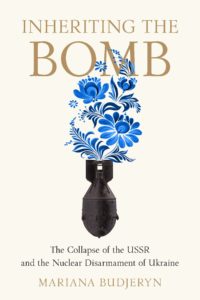
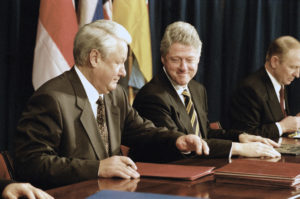
Russian President Borys Yeltsin and U.S. President Bill Clinton bump elbows after the signature of the Budapest Memorandum on security assurances to Ukraine in connection with its accession to the NPT on December 6, 1994 with Ukraine’s President Leonid Kuchma (far right), and British Prime Minister John Major (not in the photo). Photo credit: Greg Gibson, AP Photo.
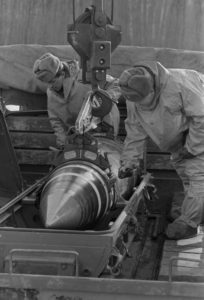
Servicemen of the 12th GUMO (General Directorate of the Ministry of Defense of the former Soviet Union) load a tactical nuclear weapon, likely a warhead for a short-range ballistic missile SS-21 Scarab, on the back of a truck in Ukraine, January 1992. The removal of some 2,000 tactical nuclear weapons deployed in Ukraine began in September 1991 and was completed by May 5, 1992. Photo credit: Vladimir Solovyev, TASS
- Episode 01: Nuclear Doctrine and the Law of Armed Conflict: A Conversation with Professor Scott Sagan
(Also available as a podcast: Spotify | Apple | Amazon)Read more
February 1, 2022
In the first episode of the series, Sarah and Hanna speak with Prof. Scott Sagan, who is the Caroline S.G. Munro Professor of Political Science, the Mimi and Peter Haas University Fellow in Undergraduate Education, and Senior Fellow at the Center for International Security and Cooperation and the Freeman Spogli Institute at Stanford University. The hosts discuss with Professor Sagan his recently coauthored article in International Security entitled, “The Rule of Law and the Role of Strategy in US Nuclear Doctrine.” The conversation tackles the relationship between nuclear doctrine and the law of armed conflict, related ethical and legal concerns, the implications for US policymakers and military planners, recommendations for the upcoming Nuclear Posture Review, and more generally the dangers inherent in “siloing” legal and strategic studies.
About the Videocast
Series Teaser
Machiavelli in the Ivory Tower is a new videocast series on arms control, nonproliferation, and international security issues. In each episode, hosts Sarah Bidgood and Hanna Notte discuss cutting-edge research and what it means for the most pressing challenges facing policymakers today. In conversation with expert guests, Sarah and Hanna break down these complex topics in ways that bridge the divide between scholarship and the real world. Join them each month as they bring Machiavelli into the Ivory Tower!
From the hosts:
By virtue of our physical location and expertise, we look at the international security landscape through different lenses. One of us (Hanna) has a background in Track II mediation and works on Russian foreign policy, US/Europe-Russia strategic relations, arms control and security issues in the Middle East, and chemical weapons, among other issues. The other (Sarah) focuses on US-Russia bilateral cooperation in the areas of nonproliferation, arms control, and risk reduction, as well as the international disarmament and nonproliferation regime more broadly. Yet, despite these differences, we share a passion for WMD policy—especially in the US/European-Russian and Eurasian context. Over the last two years, these interests have led us to collaborate on projects relating to Russian military innovation, state-level radiological weapons programs, and the future of US and Russian efforts to prevent the spread of nuclear weapons, among others. In launching Machiavelli in the Ivory Tower, we wanted to bring our diverse yet complementary perspectives to bear in exploring new issues that we think are the most important. We couldn’t be more excited to share the results with you, and we’re glad to have you along for the ride!
Subscribe
New episodes will be released here and on the CNS YouTube channel. Stay tuned!
Subscribe to the Channel:
In the News
April 19, 2022: “Why the Ukraine war does not mean more countries should seek nuclear weapons” in Middlebury Institute of International Studies
About the Hosts
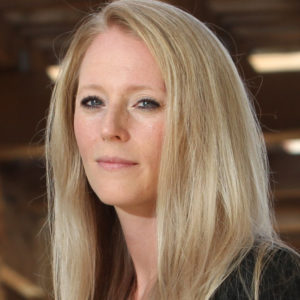
Sarah Bidgood
Sarah Bidgood is a 2023-2024 Stanton Nuclear Security Fellow in the MIT Security Studies Program. Prior to this, she served as Director of the Eurasia Nonproliferation Program at CNS. Her work focuses on U.S.-Soviet and U.S.-Russian arms control and nonproliferation cooperation, as well as the nonproliferation regime more broadly. Her research and analysis have appeared in journals such as International Security, the Journal for Peace and Nuclear Disarmament, and The Nonproliferation Review, as well as outlets including Foreign Policy, Arms Control Today, War on the Rocks, and The National Interest.
Sarah received her BA in Russian from Wellesley College. She holds an MA in Russian, East European, and Eurasian Studies from the University of North Carolina-Chapel Hill and an MA with distinction in Nonproliferation and Terrorism Studies from the Monterey Institute of International Studies. She is a PhD candidate (ABD) in Defense Studies at King’s College London, where her dissertation focuses on the relationship between Cold War nuclear crises and arms control.

Hanna Notte
Dr. Hanna Notte is the director of the Eurasia Nonproliferation Program at the James Martin Center for Nonproliferation Studies (CNS) and a Senior Associate (non-resident) in the Europe, Russia, and Eurasia Program at the Center for Strategic & International Studies (CSIS) in Washington DC. Based in Berlin, she regularly writes for English-language outlets such as Foreign Affairs, Foreign Policy, The New York Times, The Wall Street Journal, The Washington Post, and War on the Rocks, among others, and for German-language outlets such as Die ZEIT. She is the co-author of Death Dust: The Rise, Demise, and Future of Radiological Weapons Programs (Stanford University Press, 2023).
Notte joint CNS in 2020 and worked for its European branch, the Vienna Center for Disarmament and Non-Proliferation, from 2021-2023. Previously, Dr. Notte worked with The Shaikh Group, an NGO focused on informal diplomacy in Middle East conflicts, supporting its engagement with Russia. She was a visiting researcher in 2015–16 with the Institute of Oriental Studies of the Russian Academy of Sciences and the Carnegie Moscow Center.
Her current work focuses on Russia’s foreign and security policy, Russia’s relations with the Global South (the Middle East in particular), and arms control and nonproliferation in the Middle East. Dr. Notte is a regular guest on conference panels and podcasts produced by leading U.S. and European think-tanks, and she has testified as an expert witness to the U.S. House Foreign Affairs Committee (Subcommittee on the Middle East, North Africa and Global Counterterrorism). Hanna Notte is a Munich Young Leader (2024). She is proficient in Russian and Arabic.
Video Series Design and Production Specialist
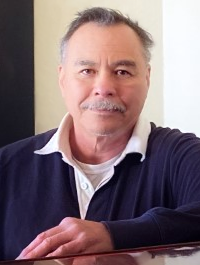
Eduardo Fujii
Eduardo Fujii is the Computer Programmer and Systems Analyst at the James Martin Center for Nonproliferation Studies at the Monterey Institute for International Studies. Since 1996, Eduardo has been writing software for a variety of CNS’s database-driven web applications, including the Non-Aligned Movement (NAM) Disarmament Database, the Analytical Hierarchical Process (AHP) decision making model applied to emergency preparedness, the WMD Terrorism Database, the CBRN Incident and Response database (IRD), the Iraq Inspections database, CNS/UNMOVIC Iraq Abstracts, and others. Eduardo is also an award-winning photographer and accomplished videographer, responsible for filming CNS seminars and lectures and making them available online and on cable TV. Eduardo was one of the first MIIS students to intern at the UN Department for Disarmament Affairs in New York, NY and in 2004 he worked as a consultant for the International Atomic Energy Agency in Vienna, Austria.
Photo Attributions
St. John’s College, Cambridge, UK
By CharlieRCD – Own work, CC BY 3.0, https-//commons.wikimedia.org/w/index.php?curid=5789057
St. John’s College second Court, Cambridge, UK
Photo by DAVID ILIFF. License- CC BY-SA 3.0
